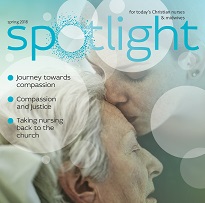I read recently that as God's children, we're all on a journey to understanding his loving heart of compassion.This reminds me of another journey that teaches us much about compassion, a journey where two 'good' men (the Levite and the priest) failed to show it, but how one stigmatised foreigner surprised everyone with the depth of concern that he showed.
This is, of course, the challenging parable of the Good Samaritan, found in Luke 10, which begins with the Samaritan man stopping his own journey to help a man in need. In binding up the beaten man's wounds, giving up his own comfort to put the man on his donkey, and by using his resources to find an inn and someone to look after him, the Samaritan demonstrates extraordinary compassion.
The Greek word here translated as 'compassion' (1) is splagchnizomai, derived from the word splagchnon meaning the guts and spleen. Splagchnizomai therefore means 'to be deeply moved in one's bowels', or 'to be moved with compassion,' (for the bowels were thought to be the seat of love and pity).
This profound word for compassion is translated on only twelve other occasions and can all be found in the gospels. The word is attributed solely to the actions of either Jesus or Father God. Most of these are found in Jesus' telling of the parables to convey the compassionate heart of Father God to the lost, the needy and the broken. It is the same word used in Luke 15:20 that the father of the prodigal son felt on seeing him return:
'So he returned home to his father. And while he was still a long way off, his father saw him coming. Filled with love and compassion, he ran to his son, embraced him, and kissed him.'
Jesus, reflecting God's heart, was moved with compassion by the lost souls of people, (2) their brokenness, (3) their sickness, (4) their hunger (5) and their need. (6) His heart was full of love and compassion poured out on all people, not just the deserving.
Jesus' compassion was always translated into action. True compassion is gut wrenching; it cannot leave us unmoved. The deep stirring within us demands action and is not content to pass on by like the priest and Levite in the parable of the Good Samaritan.
This parable finishes with Jesus saying 'If a man would come after me let him deny himself and take up his cross and follow me. For whoever would save his life will lose it and whoever loses his life for my sake will find it'. (7)
Making the choice to show compassion and help those in need can be a costly one. Like the action shown by the Good Samaritan, it can be inconvenient and time consuming to stop and help, it may demand sharing of our possessions and money, and it may require ongoing commitment to see it through ('Whatever more you spend I will repay you when I come back', Luke 10:26).
We follow a God who understands what costly love looks like, who gave his one and only son for our redemption, who withheld nothing to restore us and help us. We have the ultimate model to follow as we serve him in our own lives. The good news of Jesus is not simply spoken, but a demonstration of God's love by reaching out to the broken-hearted, the poor, and the needy. We follow a God of love who longs to display his heart of love to those around us, by working through us.
Action birthed in compassion may not only be practical care for someone; it may also be a fight for justice for a vulnerable person. Alongside God's abundant grace to the poor and needy, runs his inherent hatred of injustice. Social action is not an optional extra for God's people. The social injustices of our day and all the afflictions caused by social injustice - poverty, hunger, crime, family breakdown, alcoholism and drug abuse, etc. require a response from the Church.
Yet in a broken society with so much need, our busyness, tiredness, or self-protection may cause us to walk on by the person in need. I know myself that I often have a packed schedule and a dull heart, and can too easily pass by a homeless person or rush to see a friend and bypass a lonely person. Writing this, I am challenged to think, when was the last time I was moved to the depths of my being about the plight of another person?
The most common cause of burnout in nurses is 'too much to do and not enough time to do it'. This may be all too familiar to you. Dr Philip Clarke in his book A Heart of Compassion (2006) says that one of the greatest challenges we face as modern Christians is to overcome the tyranny of 'having no time'. He writes 'if we are to bring a distinctive savour to our modern society, we may need to make radical decisions when choosing the pathway for our lives'. One such decision for him was to live in a smaller home with a lesser mortgage, than as a GP he could have extended himself to, in order to be able to work part-time and free up the precious commodity of time - time, which he intentionally used, for acts of compassion and justice.
Faced with enormous needs, it's easy to be overwhelmed. It helps me to remember that when Mother Theresa was asked how she coped with the insurmountable need of the poor who she served in Calcutta, she replied 'One by one.'
Cardinal John Dearden composed this prayer:
'We cannot do everything. And there is a sense of liberation in realising that. This enables us to do something and to do it very well. It may be incomplete but it is a beginning, a step along the way, an opportunity for the Lord's grace to enter and do the rest. We may never see the end results but that is the difference between the master builder and the worker. We are the workers not the master builders, we are the ministers not messiahs.' (8)
One of the most helpful bits of advice I have been given has been to realise that my responsibility and area of influence isn't everyone and everything in the world, but rather the key people and situations around me. Family, neighbours, friends, church, ministries, work colleagues and patients are my key sphere of influence and responsibility. There are certain situations and relationships to which God has uniquely gifted us, called us, and placed each one of us. Although not exclusive, these remain our key priorities in which we uniquely can be used as God's hands and heart of compassion. As Oscar Romero says, 'we can't do everything, but let's start with doing one, a small thing well and faithfully'.
Heidi Baker is a heroine of mine for her simple surrender, obedience and trust in the Lord for the unique call she had on her life. She and her husband Rolland, pour out their lives among abandoned street children in Mozambique. As the Holy Spirit moved miraculously in many ways, revival spread to adults, pastors, and churches and then throughout the whole country. In her book Compelled to Love Heidi writes 'I did not move to Mozambique with an action plan to save the country. My goal was not to start a revival. I came to learn to love, and I am just still at the beginning of that journey today. I am just starting to learn how to love more. I believe this is my lifetime goal. I want to love God with everything within me. I wantto love my neighbor as myself.
…God calls all of us - rich and poor - to rest in him with all our heart, mind, soul and strength, loving our neighbors as ourselves. For this Jesus died'. (9)
Let's try and carve time to come before God and ask him to renew our hearts with his compassion, to refresh our tired spirits, open our eyes and unplug our ears so we can see and hear who is 'the one' today that he would have us spend time with, listen to, empathise with, and minister to. We all need God's grace and help, to be renewed and led by his Spirit on this journey of compassion.
I'll finish with the words of Brendon Manning from his book Ruthless Trust (10) where he writes:
'Our culture says that ruthless competition is the key to success. Jesus says that ruthless compassion is the purpose of our journey.'
































